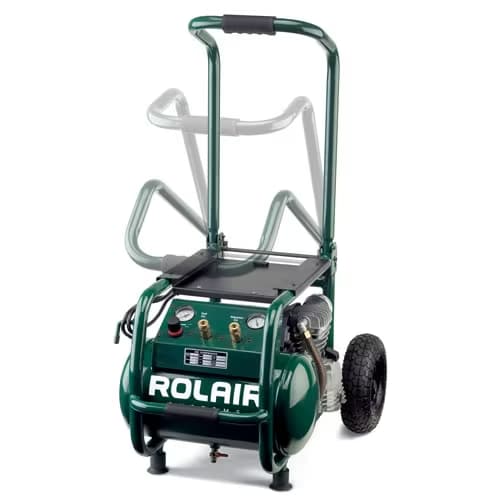![Top 5 Best Air Compressors for a Home Garage [Expert-Picked] Top 5 Best Air Compressors for a Home Garage [Expert-Picked]](https://www.aircompressorsdirect.com/article-image/1200/social_img_663.jpg?impolicy=article-1200-350)
Top 5 Best Air Compressors for a Home Garage [Expert-Picked]
Whether you're a "Weekend Warrior" or someone who runs a business out of your garage, having the right air compressor can be critical for your productivity. However, the world of air compressors can be overwhelming if you're trying to navigate on your own.
To help you, I've compiled this list of the best air compressors for a home garage. These are all single-stage air compressors because that's usually enough for most home applications. Click on each model below to view the product page filled with more features, specs, reviews, and other great resources. Also, check out my criteria for picking the best compressors.
The Best Air Compressors for Home Garage
| Best Air Compressor for Home Garage | Best Tire Inflator | Best Air Compressor for Nail Gun | Best Air Compressor for Home Sprinkler Blowout | Best Air Compressor for Air Tools |
|---|---|---|---|---|
|
|
|
|
|
|
Best Air Compressor for Home Garage: Puma PK6560V
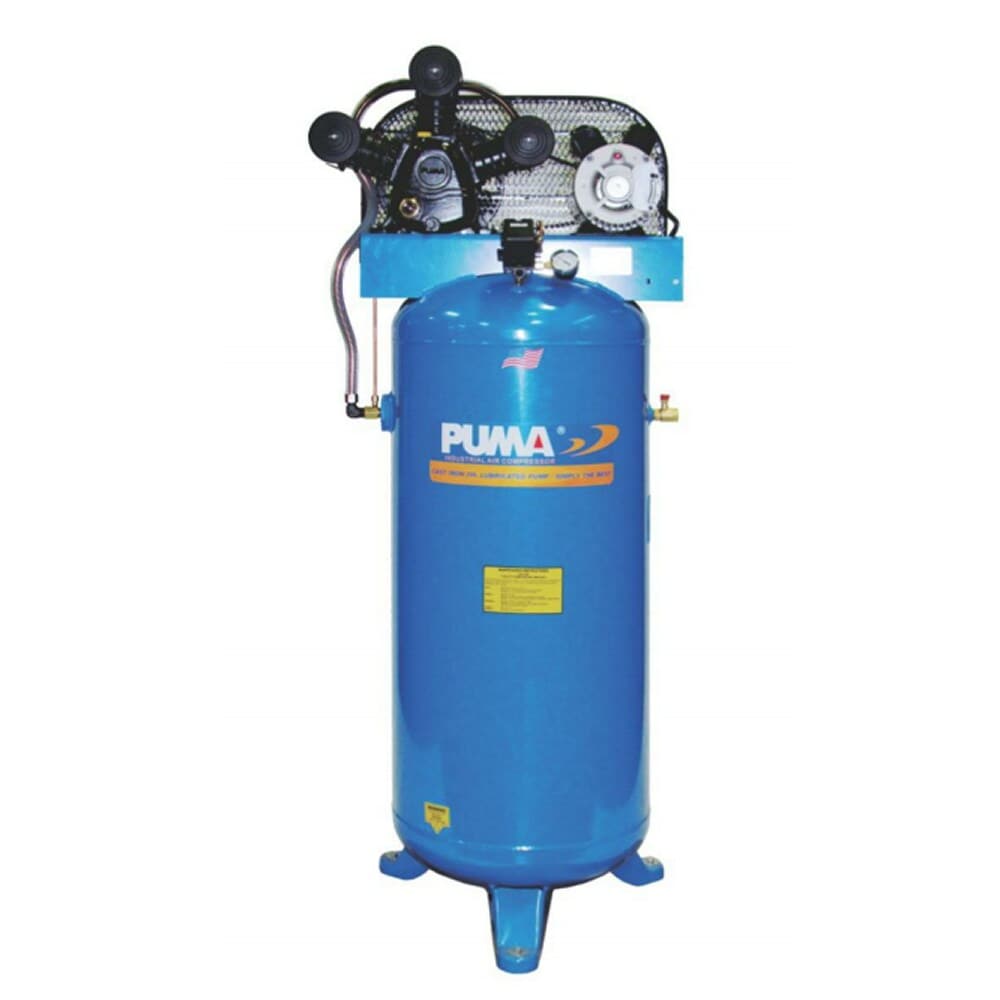
If you regularly use air tools for home DIY projects, I recommend you outfit your garage or shed with a Puma PK6560V 5-horsepower air compressor. This 60-gallon stationary unit provides 15.5 CFM of airflow at 90 PSI, making it perfect for construction tools like impact or nail guns. It can also support multiple users for repair or fabrication work
Its 1180 RPM, three-cylinder pump is made of cast iron for enhanced durability and longer service life than aluminum. It also reduces heat transfer between cylinders for less wear. The 3450 RPM capacitor-start motor eliminates the need to get an expensive magnetic starter and comes equipped with overload protection. This belt-driven motor also includes a sturdy guard housing and is simple to access and maintain.
The PK6560V compressor runs on 208/230-volt single-phase power, so it's easy to work into your garage setup. Note that the unit doesn’t come with a 230-volt plug, and you’ll need to purchase that separately to meet local codes. Overall, you can count on the PK6560V to help get the job done at a very reasonable upfront cost.
| Power |
| - 15.5 CFM @ 90 PSI - 135 PSI maximum - 5-HP 208-230-volt single-phase AC Motor |
| Reliability |
| - Cast-iron, 3-cylinder pump - Overload protection on motor - Sturdy belt guard housing |
| Efficiency |
| - 1180 RPM pump |
| Noise |
| - Est. 80 - 90s dBA |
| Overall Value |
| - Great power and durability for the price |
Who It's For:
- Weekend Warriors
- Home Hobbyists
Who It's Not For:
- Professionals
Runner Up: Campbell Hausfeld TQ3104
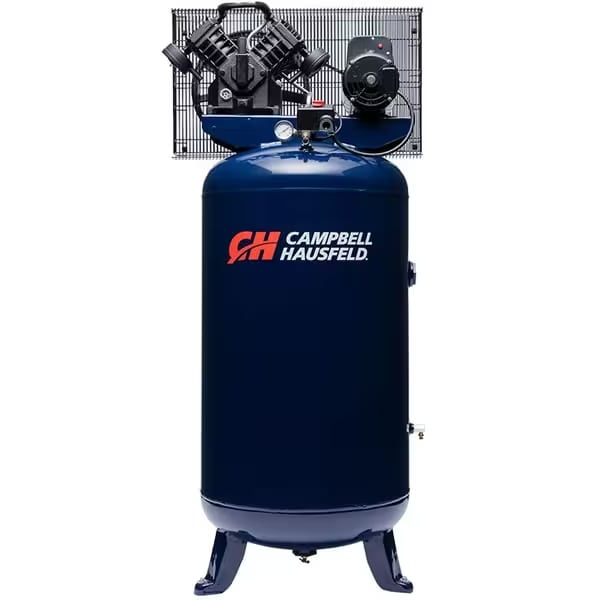 The Campbell Hausfeld TQ3104 is a great runner-up, offering 16 CFM at 90 PSI and a maximum PSI of 140. Its efficient, 5-horsepower 208-230 single-phase motor reduces wear thanks to a low 840 RPM speed. It comes with an 80-gallon tank and has a lifetime of over 10,000 hours. This powerful, efficient unit will make an excellent addition to any hobbyist's garage.
The Campbell Hausfeld TQ3104 is a great runner-up, offering 16 CFM at 90 PSI and a maximum PSI of 140. Its efficient, 5-horsepower 208-230 single-phase motor reduces wear thanks to a low 840 RPM speed. It comes with an 80-gallon tank and has a lifetime of over 10,000 hours. This powerful, efficient unit will make an excellent addition to any hobbyist's garage.
Best Tire Inflator: Chicago Pneumatic WallAIR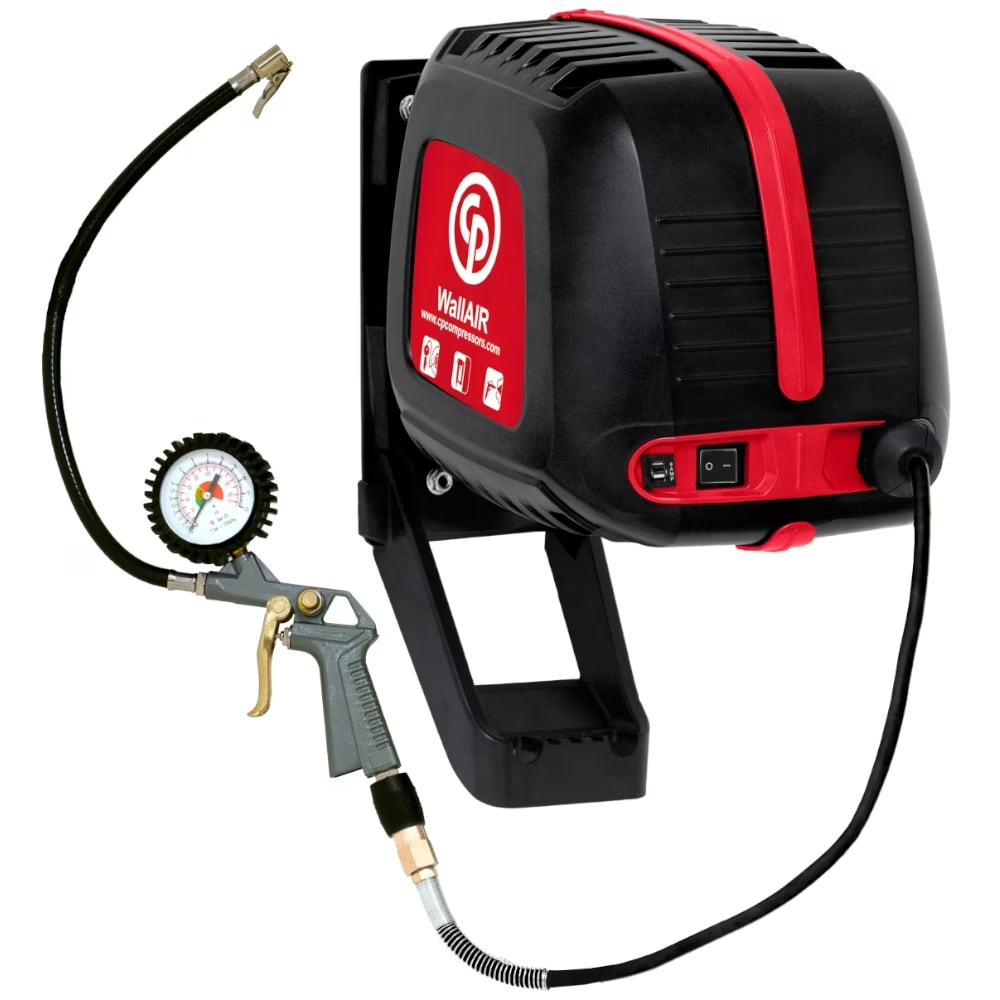
If you have a garage workshop at home, it’s not complete until you install the Chicago Pneumatic WallAIR tire inflator, which I think is the best on the market today. It provides 130 PSI of air for all your inflating needs while being extremely quiet and compact. Best of all, it plugs straight into a normal 115-volt wall outlet!
The WallAIR mounts directly onto your wall to save space and comes with a 32-foot, quick-disconnect hose that can swivel and be reeled in. Besides the compressor, an inflation kit is included, containing an inflation gun, a set of metal and plastic nozzles, and an adapter (blow gun nozzle). Oil-free operation means zero risk of contaminated air, zero chance of oil spills, and less maintenance. Plus, I love the fact that it’s only 68 decibels. I can’t tell you how many times I got complaints for being too loud in the garage. Now, it’s no louder than a normal conversation.
Overall, you can’t go wrong with this inflator, especially since you’ll pay less than $200 for it. Unlike many picks on this list that are most useful for serious DIYers and hobbyists, this inflator is something virtually everyone can benefit from.
| Power |
| - 1.7 CFM @ 90 PSI - 130 max PSI - 1.5-horsepower - 120-volt AC motor |
| Reliability |
| - Oil-free piston pump - Offers a consistent range of CFM output |
| Efficiency |
| - Saves floor space by mounting on the wall - A 30-foot air hose can reach distant cars |
| Noise |
| - Quiet at 68 decibels |
| Overall Value |
| - Great price for a garage compressor to inflate tires and handle small tasks |
Who It's For:
- Typical Homeowners
- Hobbyists
Who It's Not For:
- Those needing portable air
- Professionals
Runner Up: Pro-Force VPF0000201
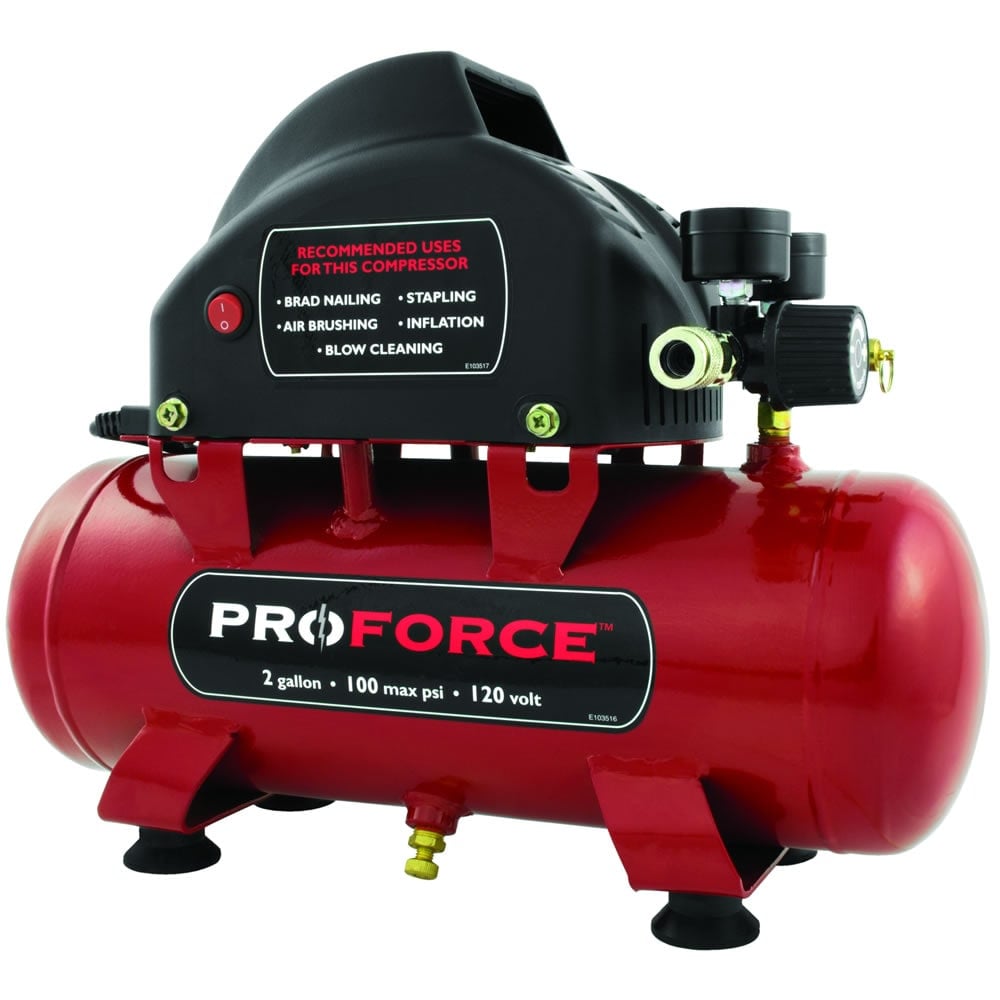 When you need to fill a tire in a pinch, the Pro-Force VPF0000201 has your back. At only 22 pounds, it’s easy to carry wherever you need it with a built-in handle, and it conveniently plugs into any standard 120-volt outlet. It produces 1 CFM of airflow at 90 PSI and is designed for easy cold weather starting. Plus, it comes with a kit that includes a 25’ hose, blow gun, inflation needle, and other useful components.
When you need to fill a tire in a pinch, the Pro-Force VPF0000201 has your back. At only 22 pounds, it’s easy to carry wherever you need it with a built-in handle, and it conveniently plugs into any standard 120-volt outlet. It produces 1 CFM of airflow at 90 PSI and is designed for easy cold weather starting. Plus, it comes with a kit that includes a 25’ hose, blow gun, inflation needle, and other useful components.
Best Air Compressor for Nail Gun: Quincy Q13160VQ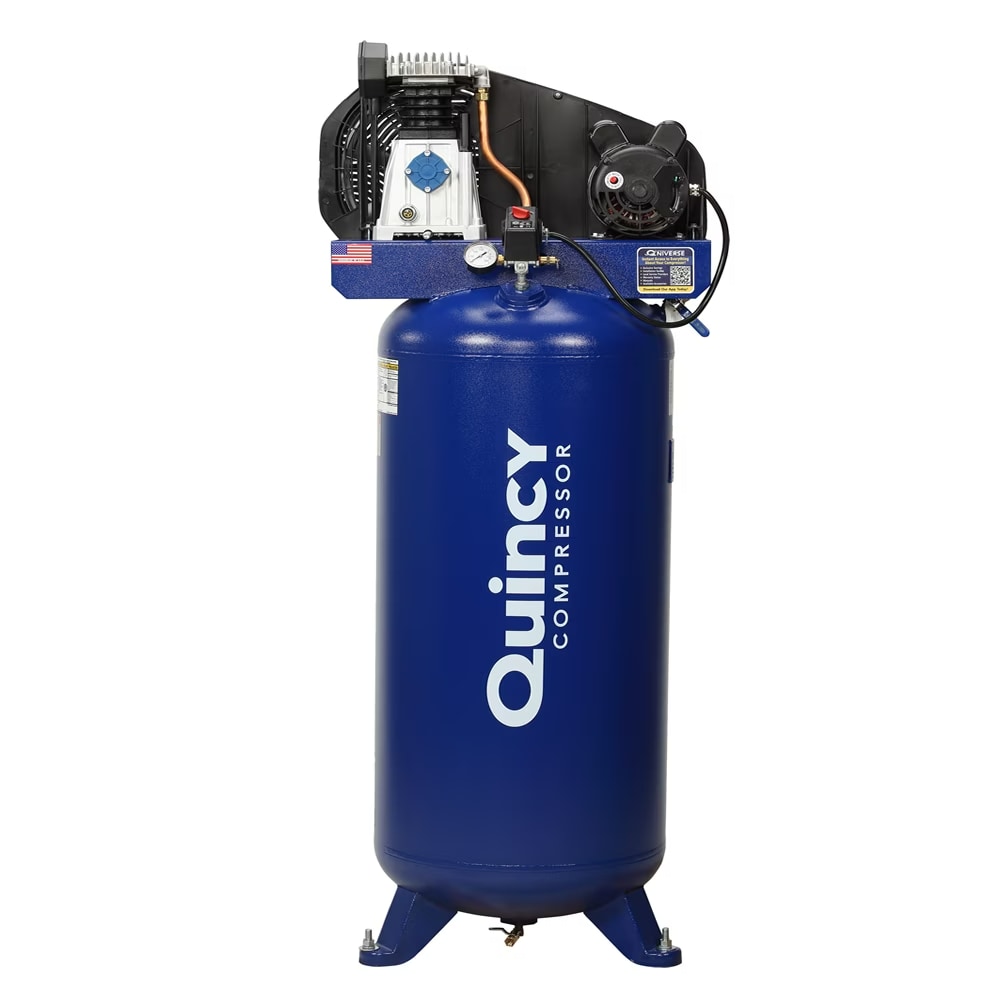
For regular do-it-yourself projects involving a nail gun, whether it’s a framing or finishing nailer, I recommend the Quincy Q13160VQ single-stage air compressor. Able to provide 12.8 CFM at 100 PSI, this unit offers plenty of power to run a wide range of air tools, including air brushes, drills, sanders, spray guns, and, of course, nail guns. Even better, it provides this power up to 42% more efficiently than competing units, meaning you get more air for less electricity.
The Q13160VQ features a cast iron cylinder, crankshaft, and valve plate for strength and durability. An aluminum head and special fin design help dissipate heat and keep the compressor running cool for a longer life. In fact, the pump has a 10,000+ hour rating. It’s also factory-tested at full pressure so that you can count on its reliability. Other great features include a start-stop pressure switch, easy-to-read gauges, and a fully enclosed belt guard. Plus, get a 3-year extended warranty on the pump just by purchasing a maintenance kit with the unit.
Perhaps best of all, Quincy air compressors have a long legacy and have been proven by the test of time. It's quite possible your grandpa's air compressor was a Quincy! I highly recommend this air compressor as a product you can trust.
| Power |
| - 12.8 CFM @ 100 PSI - 135 PSI maximum - 3.5-HP 230-volt single-phase AC motor |
| Reliability |
| - Cast iron cylinder, crankshaft, & valve plate - Aluminum head; 10,000+ hour pump rating |
| Efficiency |
| - Efficient valve plate design - Special fin design helps dissipate heat |
| Noise |
| - Estimated 80 - 90s dBA |
| Overall Value |
| - Durable unit that will pay off on projects for years to come |
Who It's For:
- Weekend Warriors
- Home Hobbyists
Who It's Not For:
- Professionals
Runner Up: MEGA 6560VB
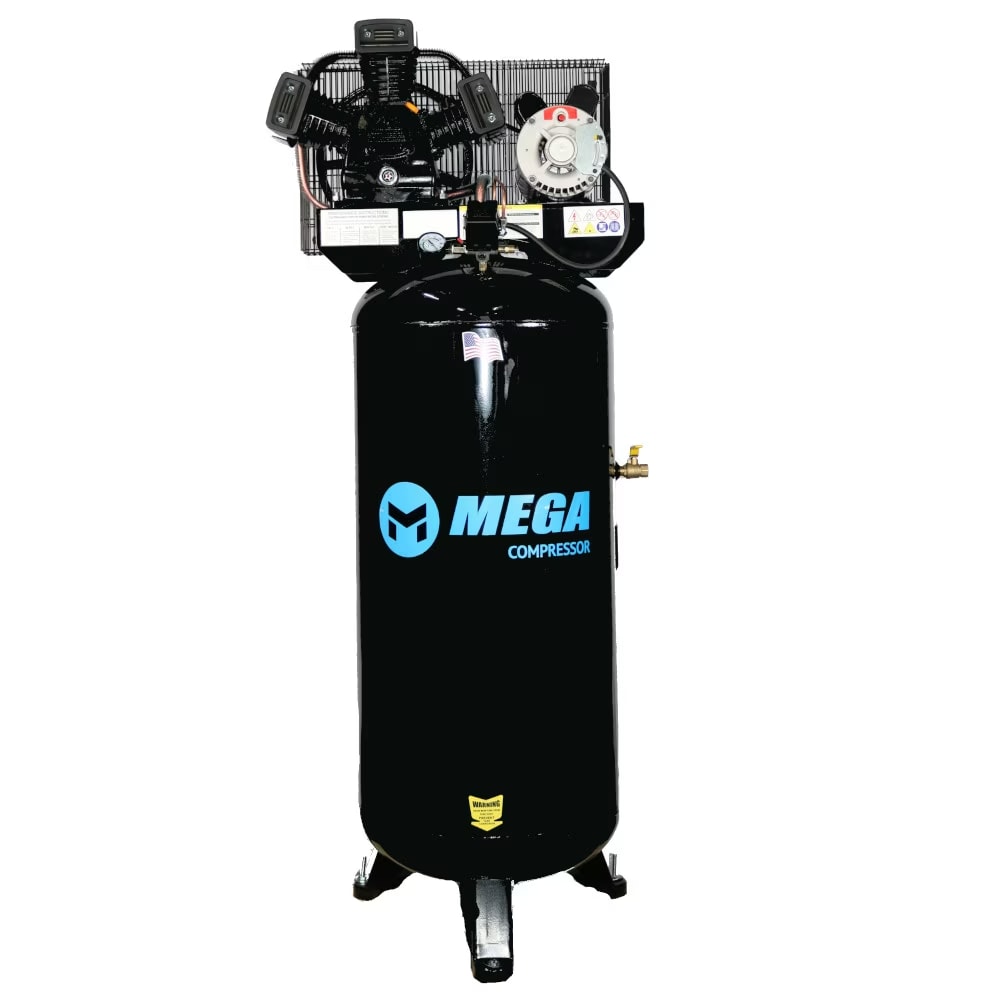 Our runner-up is the MEGA 6560VB 5-horsepower air compressor. Providing 18 CFM at 90 PSI and a maximum PSI of 150, this compressor is perfect for everyone from home DIYers to professionals. Besides nailing, you can tackle airbrushing, drilling, sanding, and bolting. The one-piece cast-iron crankcase and aluminum head maximize durability and lifespan.
Our runner-up is the MEGA 6560VB 5-horsepower air compressor. Providing 18 CFM at 90 PSI and a maximum PSI of 150, this compressor is perfect for everyone from home DIYers to professionals. Besides nailing, you can tackle airbrushing, drilling, sanding, and bolting. The one-piece cast-iron crankcase and aluminum head maximize durability and lifespan.
Best Air Compressor for Home Sprinkler Blowout: Rolair VT25BIG
Blowing out home sprinklers is a critical task for which you need the right tool. I recommend the Rolair VT25BIG direct-drive air compressor. Even though it’s consumer-grade and runs on 115 volts, it can deliver an astounding 6.5 CFM at 90 PSI. That’s extremely impressive for an air compressor of this size. I was even more amazed after learning that it provides a duty cycle of 100% for continuous performance.
Inside the compressor, you'll find contractor-grade construction. Durable stainless steel reed valves and a cast iron cylinder maximize lifespan, all guarded by a protective roll cage. You’ll also find a built-in pressure regulator with gauges to adjust PSI between air tools. Plus, two quick-connect inlets let you run two tools at once.
Beyond this, I think it’s one of the most portable units available. It has extra-large, fully pneumatic tires and an exceptionally high handle that prevents you from kicking the compressor with your heels while pulling it. When you’re done moving it, the handle folds for easy storage. With the Rolair VT25BIG, you get great power, features, and portability at a relatively low price. Use it for car tires, sprinkler blowouts, and other basic tasks.
| Power |
| - 6.5 CFM @ 90 PSI -135 PSI maximum; - 2.5-HP SP-Series 115-volt single-phase motor |
| Reliability |
| - Heavy-duty, industrial-grade motor - Durable stainless reed valves & cast iron cylinder last longer |
| Efficiency |
| - 100% duty cycle for continuous use |
| Noise |
| - Estimated 80 - 90s dBA |
| Overall Value |
| - Great value for home maintenance tasks like tire inflation and sprinkler blowouts |
Who It's For:
- General Homeowners
- Hobbyists
- Contractors
Who It's Not For:
- Commercial/Industrial users
Runner Up: Campbell Hausfeld VT6271
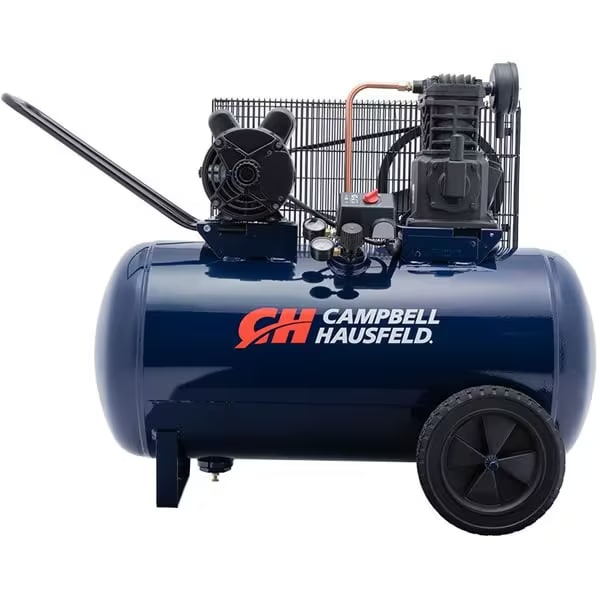 We chose the Campbell Hausfeld VT6271 as our runner-up primarily for its power. If you don't have garage space for a stationary compressor but need more airflow, the VT6271 is your ticket, providing 10.2 CFM at 90 PSI and a maximum of 135 PSI. It requires 230-volt power and is great for serious DIY users, professionals, or contractors.
We chose the Campbell Hausfeld VT6271 as our runner-up primarily for its power. If you don't have garage space for a stationary compressor but need more airflow, the VT6271 is your ticket, providing 10.2 CFM at 90 PSI and a maximum of 135 PSI. It requires 230-volt power and is great for serious DIY users, professionals, or contractors.
Best Air Compressor for Air Tools: Ingersoll Rand SS3L3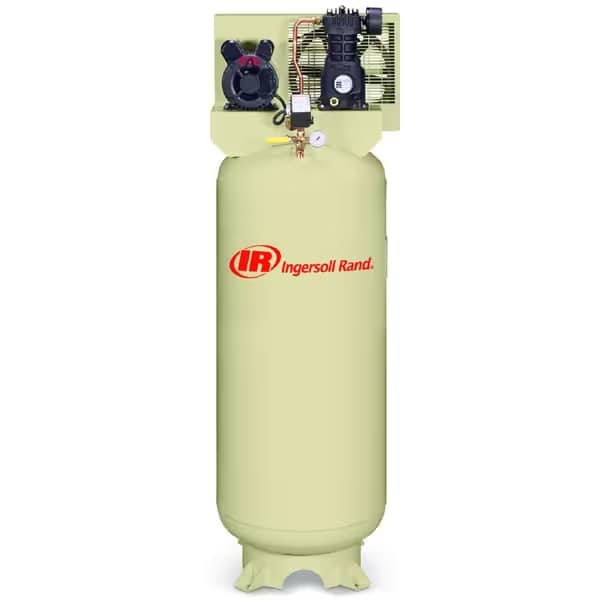
If you’re looking for a one-size-fits-all solution for powering your home air tools, then I recommend the SS3L3 single-stage air compressor from Ingersoll Rand. It’s a consumer-grade compressor that is great for home hobbyists and weekend warriors looking to do woodworking, painting, and auto work.
The SS3L3 provides 11.3 CFM at 90 PSI and is designed for continuous-duty applications thanks to the deep fin configuration of its cylinders, which improves cooling. It comes with a 60-gallon tank and can produce a maximum of 135 PSI. Cast-iron cylinders extend the pump’s life, contributing to its 5,000-rated hours of trouble-free use. Thermal overload protection and a totally enclosed belt guard provide additional safety. Its synthetic lubricant increases efficiency by lasting four times longer than petroleum-based oil. Finally, an oil sight gauge lets you easily check the pump oil level.
As icing on the cake, Ingersoll Rand offers a two-year warranty when you purchase the compressor and start-up kit. Plus, it’s assembled here in the U.S.A. Yes, it’ll cost you more than smaller compressors, but if you’re serious about powering a large variety of air tools like nailers, paint sprayers, riveters, and more, this is the unit to buy.
| Power |
| - 11.3 CFM @ 90 PSI - 135 PSI maximum - 3-HP, 230-volt single-phase AC motor |
| Reliability |
| - Cast-iron cylinders & frame - Thermal overload protection - Enclosed belt guard - 5,000+ hour working life |
| Efficiency |
| - Continuous duty operation - Deep fin cooling design |
| Noise |
| - Est. 80 - 90s dBA |
| Overall Value |
| - A great jack-of-all-trades compressor for pneumatic tools |
Who It's For:
- Weekend Warriors
- Home Hobbyists
- Home Shopowners
Who It's Not For:
- Professionals
Runner Up: DeWalt DXCM602
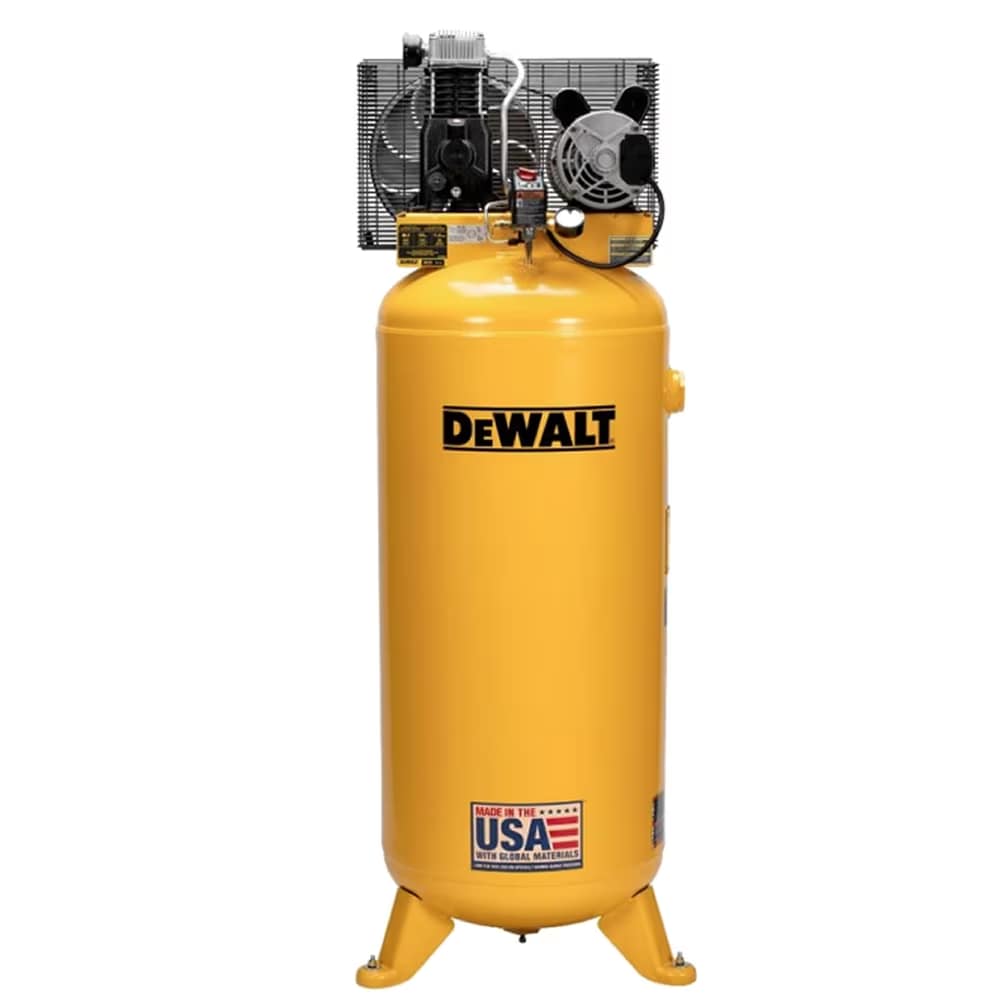 The DeWalt DXCM602 3.7-horsepower air compressor delivers over twice the air tool run time of similar units with a 30% higher PSI. It provides 11.5 CFM at 90 PSI with a maximum of 175 PSI thanks to its 208-230-volt single-phase AC motor. Designed with a cast-iron twin cylinder, a high-efficiency flywheel, and conveniently placed controls, this unit is perfect for a serious hobbyist who needs to run multiple air tools reliably.
The DeWalt DXCM602 3.7-horsepower air compressor delivers over twice the air tool run time of similar units with a 30% higher PSI. It provides 11.5 CFM at 90 PSI with a maximum of 175 PSI thanks to its 208-230-volt single-phase AC motor. Designed with a cast-iron twin cylinder, a high-efficiency flywheel, and conveniently placed controls, this unit is perfect for a serious hobbyist who needs to run multiple air tools reliably.
How We Picked the Best Home Air Compressors
When recommending home garage air compressors, we take five features into account.
Power
We start with the amount of power the air compressor can produce. There are two main characteristics of air compressor power: Cubic Feet per Minute (CFM) and Pounds per Square Inch (PSI). CFM refers to how much air the air compressor can deliver per minute (the volume), while PSI measures the force of the air. These two characteristics work together in a crucial balance to satisfy the needs of your application.
For example, if you’re using a tire inflator, airbrush, or dental tools, then having high pressure is more important than high volume. The opposite is true for paint sprayers, nail guns, and other tools where you need more volume. Many of our best air compressor categories are based on application, so you can be sure we’re recommending the product with the best PSI or CFM—whichever is needed. Finally, both CFM and PSI are determined by the motor’s horsepower, which is another aspect of power we consider, along with the voltage requirements.
Reliability
When you buy an air compressor, you want it to last for years. That’s why reliability is so important when making our best picks. We start with the overall construction and design. What is it made of? Does it have protective features like air filters to keep out contaminants?
After that, we look at the operation. Is there built-in technology that reduces wear and tear? How does it handle vibration or moisture? Finally, what is its rated lifetime in hours? How many years can you expect this air compressor to last? By examining reliability and durability, we’re making sure you don’t have to buy a replacement every couple of years.
Efficiency
We measure efficiency by how well an air compressor can deliver your air needs with minimal downtime, and at the lowest cost to you as possible. Compressors that can do both very well rank highly because they perform almost continuously, don’t slow down your performance, and save you money in the process.
One of the key measurements in this is an air compressor’s duty cycle, which represents how long it can operate before needing to cool down or refill the air tank. The higher the duty cycle percentage, the longer it can operate continuously without issue. For example, an air compressor with a 50% duty cycle will run 50% of the time without needing a break.
Efficiency can take many forms in an air compressor, so we look at the whole unit to determine what features are in place to help bridge the gap between cost and performance. Features like low RPM motors, aftercooling technology, a compact design, a high-efficiency intercooler, and other aspects that improve compressor life and dependability may be considered in our final ratings.
Noise
Sound level is an increasingly important factor, especially in traditionally loud piston air compressors. That’s why we reward quieter air compressors with a higher ranking. The best piston air compressors today are barely louder than the average human conversation.
When you need a compressor running in a workshop, the garage, a tire shop, or on the factory floor, there are certain safety standards that must be met to prevent hearing loss and other problems, like not being able to hear someone shouting. In short, we think you should be able to work on your projects safely and without worrying about going deaf!
It’s important to point out that the measurement of loudness in decibels is not standardized across the industry, and different manufacturers may test the loudness of their compressors differently. To combat the discrepancies, we typically consider brands that pledge to test their loudness consistently through organizations like C.A.G.I. or publish their testing standards so we can fairly compare them with other compressors. Of course, the best and most accurate way to know is to listen to as many compressors as we can in person and make determinations on our own.
Overall Value
Taking all the above criteria into account, along with price, leads us to an overall value appraisal for each air compressor recommendation. We don’t go by the “cheapest” air compressor alone because you’re going to get what you pay for, and we prioritize performance and quality. The sweet spot of affordability and performance is what we're after.
Home Garage Air Compressor FAQs
How Do Air Compressors Work?
Any air compressor for home use, whether you're a Weekend Warrior or running a business out of your garage, will be a reciprocating type, which operates using pistons. An internal crankshaft drives the pistons inside the cylinders in a back-and-forth motion, creating a vacuum that sucks air in when it retracts. When the piston extends back up, it pushes air into a tank or output chamber and pressurizes it. At that point, the compressed air is ready for use.
What is the Difference Between a Single-Stage and Two-Stage Air Compressor?
A single-stage air compressor compresses air only one time, while a two-stage air compressor compresses air twice to increase the amount of pressure.
In a two-stage compressor, air comes through the inlet and is compressed by a large piston. It then travels through an intercooler, a copper tubing that helps cool it down, into a second chamber where it is compressed again by a smaller piston. This double-pressurized air is then transferred to the storage tank or output. As a result, two-stage air compressors are better for heavier-duty, professional air applications.
What is CFM?
CFM stands for Cubic Feet per Minute and describes "how much" air is produced, or its volume. An air compressor rated for 15 CFM can produce 15 cubic feet of pressurized air per minute.
What is PSI?
PSI stands for Pounds per Square Inch and describes the pressure, or force, of air. An air compressor rated for 100 PSI can produce 100 pounds of air pressure per square inch.
How Does CFM Relate to PSI?
When reading air compressor specs, you'll find CFM ratings listed at a certain PSI rating, i.e. 15.5 CFM at 90 PSI. That means that, when the compressor is producing 15.5 CFM of airflow, it is doing so at a pressure of 90 PSI. If you increase the pressure in PSI, the air volume (CFM) will decrease and vice versa. Understanding this is important when sizing an air compressor for your tools and equipment.
What Size Air Compressor Do I Need?
When sizing a portable air compressor, start with what you'll be using it for and how often. Having to power a pneumatic nail gun every few months will require much less power and runtime than having an auto shop where you're using air tools all day, every day. This will help narrow down what type of portable compressor you need (pancake, wheelbarrow, truck-mounted, etc.).
Once you've established use and frequency, figure out how much air volume in CFM and air pressure in PSI you need. This should be specified in your air tool manuals. For example, if you'll be running at most three impact wrenches that each require 10 CFM, then you'll need a compressor that can handle 30 CFM to keep up. As always, you can contact us with any questions, and I'll be happy to assist with your sizing!
About Melissa
Melissa has been fascinated by air power since childhood when she would help her dad with hobbies using his old compressor. Years later, she would heavily use compressors herself when powering air tools for building theater set designs.
Her ability to fuse her fascination with air tools with her passion for theater exemplifies how compressors can play a role in almost any profession—from brewing to auto work and dentistry to heavy industry. After designing sets for eight years, Melissa worked as a flooring and window treatments manager for seven years before joining the Air Compressors Direct team.
Today, as the air compressor expert, Melissa sets the stage for customers’ success with a whole range of air applications. When not at work, she uses air compressors herself on various home improvement projects. Besides this, she enjoys spending time with friends and family, including her cats, outdoor activities, painting, gaming, and watching musicals.
You can count on Melissa to pull back the curtain on air compressors and answer all your questions and concerns!

